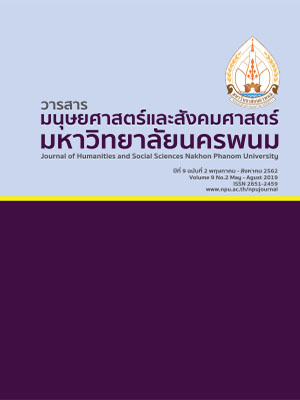The Linear Structural Equation Model of Teachers’ Competencies Affecting Students’ Quality in The 21st Century in The Northeast Region of Thailand
Main Article Content
Abstract
The objectives of this research were: 1) to develop a linear structural equation model and 2) to check if the developed linear structural equation model of teachers’ competencies affecting students’ quality in the 21st century in the Northeast region of Thailand has goodness-of-fit with the empirical data. The research was divided into 2 phases. The first phase was building a conceptual framework for research by analyzing relevant documents and research, interviewing with 7 experts and studying the three outstanding schools. The second phase was verifying the research hypothesis. Data were collected using a 5 point rating scale questionnaire with the discrimination power values ranging between 0.27 and 0.79 and the overall reliability value of 0.98. The sample was a total of 600 people. Administrators and teachers under Offices of Secondary Education Service Areas in the Northeast region of Thailand in academic year 2017. Data were analyzed using frequency, percentage, mean, standard deviation and Pearson’s product moment correlation coefficient. The LISREL software was employed to analyze the linear structural equation model.
The study yielded the following results: 1) The linear structural equation model of teachers’ competencies affecting students’ quality in the 21st century in the Northeast region of Thailand comprised 5 competencies, personal competency, leadership competency, moral and ethical competency, classroom management competency, and learning management competency. 2) The developed model showed a goodness-of-fit with the empirical data with statistics value as follows: = 100.47, p-value = 0.97030 df = 129, /df = 0.7788, RMSEA = 0.000, GFI = 0.99, AGFI = 0.97, CN = 999.16, CFI = 1.00, RMR = 0.0058 When considering the coefficient of prediction (R2) of the 5 aforementioned competencies, it was found that they could jointly explain 79 percent of the variance of students’ quality in the 21st century.
Article Details
References
นงลักษณ์ พิมพ์ศรี. (2559). การพัฒนาครูในสถานศึกษาเพื่อรองรับการประเมินสมรรถนะประจำสายงานด้านภาวะผู้นำครู. วิทยานิพนธ์ปริญญาดุษฎีบัณฑิต. บุรีรัมย์ : มหาวิทยาลัยราชภัฏบุรีรัมย์.
วิจารณ์ พานิช. (2558). วิถีสร้างการเรียนรู้เพื่อศิษย์ ในศตวรรษที่ 21. วารสารนวัตกรรมการเรียนรู้, 1(2), 3-14.
วิโรจน์ สารรัตนะ. (2557). กระบวนทัศน์ใหม่ทางการศึกษา; กรณีนานาทัศนะการศึกษาศตวรรษที่ 21. กรุงเทพฯ : ซีเอ็ดบุ๊ค เซ็นเตอร์.
สุดารัตน์ ธีรธรรมธาดา. (2558). ปัจจัยแรงจูงใจใฝ่สัมฤทธิ์ พฤติกรรมเชิงสร้างสรรค์ และความฉลาดทางอารมณ์ ที่ส่งผลต่อประสิทธิภาพในการทำงานของพนักงานบริษัทเอกชนในเขตกรุงเทพมหานคร. วิทยานิพนธ์ปริญญามหาบัณฑิต. กรุงเทพฯ : มหาวิทยาลัยกรุงเทพ.
สุทธิชัย ผ่านสุวรรณ. (2559). รูปแบบความสัมพันธ์เชิงสาเหตุของปัจจัยคุณภาพครูที่ส่งผลต่อคุณลักษณะของนักเรียนในช่วงต้นของศตวรรษที่ 21. วารสารมหาวิทยาลัยนครพนม, 6(3), 69-77.
อมรรัตน์ เชิงหอม. (2558). การพัฒนารูปแบบการบริหารโรงเรียนประถมศึกษาที่ส่งผลต่อคุณภาพนักเรียน. วารสารศึกษาศาสตร์ มหาวิทยาลัยขอนแก่น, 38(3), 193 - 200.
อรัญญา ชนะเพีย. (2559). รูปแบบความสัมพันธ์เชิงสาเหตุของปัจจัยทางการบริหารที่ส่งผลต่อคุณภาพผู้เรียนในโรงเรียนสังกัดสำนักงานเขตพื้นที่การศึกษาประถมศึกษาในภาคตะวันออกเฉียงเหนือ. วารสารมหาวิทยาลัยนครพนม, 6(3), 50-58.
Benson, E., Nduro, K. Amissah & Amissah, E.K. (2015). Factors affecting the quality of students’ research work : Exploring the perception of students. International Journal of Education, Learning and Development, 3(6), 54-67.
Margaret, C. C. (2014). An exploration of how the beliefs and self-perceptions of early childhood teachers influence their classroom practice (Unpublished doctoral dissertation). Sheffield : University of Sheffield.
Muthaa, G. (2015). Factors affecting implementation of early childhood development education in public centres in Imenti South District, Kenya. British Journal of Education, Society & Behavioural Science, 7(4), 267-272.
Translated Thai References
Chanaphia, A. (2016). A causal relationship model of administrative factors affecting quality of students in schools under Offices of Primary Education Service Areas in the Northeast Region of Thailand. Nakhon Phanom University Journal, 6(3), 50-58. [in Thai]
Choeng-hom, A. (2015). Development of a primary school administration model which affects the quality of students. Journal of Education Khon Kaen University, 38(3), 193 – 200. [in Thai]
Meeboon, T. (2018). The causal factors influencing student quality in child development centers under local administration organizations in the Northeast region of Thailand. Nakhon Phanom University Journal, 8(1), 76-84. [in Thai]
Pansuwan, S. (2016). A causal relationship model of teacher quality factors affecting the characteristics of early 21st century students. Nakhon Phanom University Journal, 6(3), 69-77. [in Thai]
Phanich, V. (2015). 21st Century Skills : Rethinking How Students. LearnJournal of Learning Innovations, 1(2), 3-14. [in Thai]
Pimsri, N. (2016). Development of teachers in schools for functional competency assement of leadership (Unpublished doctoral dissertation). Buriram Rajabhat University, Buriram, Thailand. [in Thai]
Sanrattana, W. (2014). 21st century just the beginning brighter education, brighter future let’s start now. Bangkok : Se-Ed Book Center. [in Thai]
Theerathumatada, S. (2015). Needs for achievement, creative action, and emotional quotient affecting work efficiency of private company employees in Bangkok (Unpublished master’s thesis). Bangkok University, Bangkok, Thailand. [in Thai]


